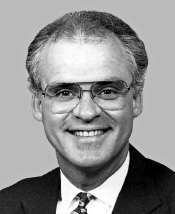Michael Parker (politician)
| Mike Parker | |
|---|---|
 | |
| Assistant Secretary of the Army for Civil Works | |
|
In office October 2001 – March 2002 | |
| President | George W. Bush |
| Preceded by | Joseph Westphal |
| Succeeded by | John Woodley |
| Member of the U.S. House of Representatives from Mississippi's 4th district | |
|
In office January 3, 1989 – January 3, 1999 | |
| Preceded by | Wayne Dowdy |
| Succeeded by | Ronnie Shows |
| Personal details | |
| Born |
October 31, 1949 Laurel, Mississippi, U.S. |
| Political party |
Democratic (Before 1995) Republican (1995–present) |
| Alma mater | William Carey University |
Michael "Mike" Parker (born October 31, 1949) is an American politician from the U.S. state of Mississippi. He served in Congress as a member of the Democratic Party and, later, the Republican Party. He later served as Assistant Secretary of the U.S. Army, with authority over the U.S. Army Corps of Engineers.
Biography
Parker was born in Laurel, Mississippi and he graduated from William Carey College with a BA in English in 1970. Before entering politics, Parker owned and operated a funeral home business, insurance companies, land and timber companies, and a sand, clay and gravel business. Parker was elected to the House of Representatives as a Democrat in 1988 following a hard-fought primary with a wide field of contenders. The district included Jackson, Vicksburg, Natchez, McComb, and Brookhaven.
Party switch

As a Democratic congressman, Parker wore his party ties very loosely. His voting record was conservative even by Mississippi Democratic standards. During Parker's successful 1992 general election campaign, he did not endorse Democratic party Presidential candidate Bill Clinton. After his re-election in November 1994, Parker voted 'Present' in the election for Speaker of the House in 1995 instead of voting for the House Democratic leader Richard Gephardt.
In November 1995, Parker completed his switch away from the Democrats and joined the Republican Party. Although his district was almost 40 percent African-American—one of the highest percentages for a Republican-held district—Parker was reelected with little difficulty in 1996. He did not run for re-election in 1998 in order to focus on his bid for Governor of Mississippi.
In the 1999 gubernatorial election Parker had almost 9,000 fewer votes than his Democratic opponent, Lieutenant Governor Ronnie Musgrove. However, due to the presence of two minor candidates, Musgrove came up a few thousand votes short of a majority. Under an 1890 law, the first tiebreaker was whoever won the most state electoral votes (based on State house districts). Each candidate won 61 of the 122 state electoral votes. The election was thus decided by the Mississippi House of Representatives, where the Democrats had a supermajority at the time. However, Parker refused to concede, and the House elected Musgrove 86-36 along partisan lines.[1]
Army Corps
Parker was appointed by George W. Bush as Assistant Secretary of the Army (Civil Works), with oversight of the Army Corps of Engineers, which has numerous projects in Parker's home state of Mississippi. Parker was one of the first political casualties of the Bush administration's heavily centralized management style when he spoke out to promote the corp of engineers priorities and was then asked to leave in the summer of 2002. In recent years Parker has been a Washington lobbyist, specializing in infrastructure issues.
References
External links
- United States Congress. "Michael Parker (id: P000066)". Biographical Directory of the United States Congress.
- Parker's lobbying profile
| United States House of Representatives | ||
|---|---|---|
| Preceded by Wayne Dowdy |
Member of the U.S. House of Representatives from Mississippi's 4th congressional district 1989–1999 |
Succeeded by Ronnie Shows |
| Party political offices | ||
| Preceded by Wayne Dowdy |
Republican nominee for Governor of Mississippi 1999 |
Succeeded by Chris Cannon |
| Political offices | ||
| Preceded by Joseph Westphal |
Assistant Secretary of the Army for Civil Works 2001–2002 |
Succeeded by John Woodley |